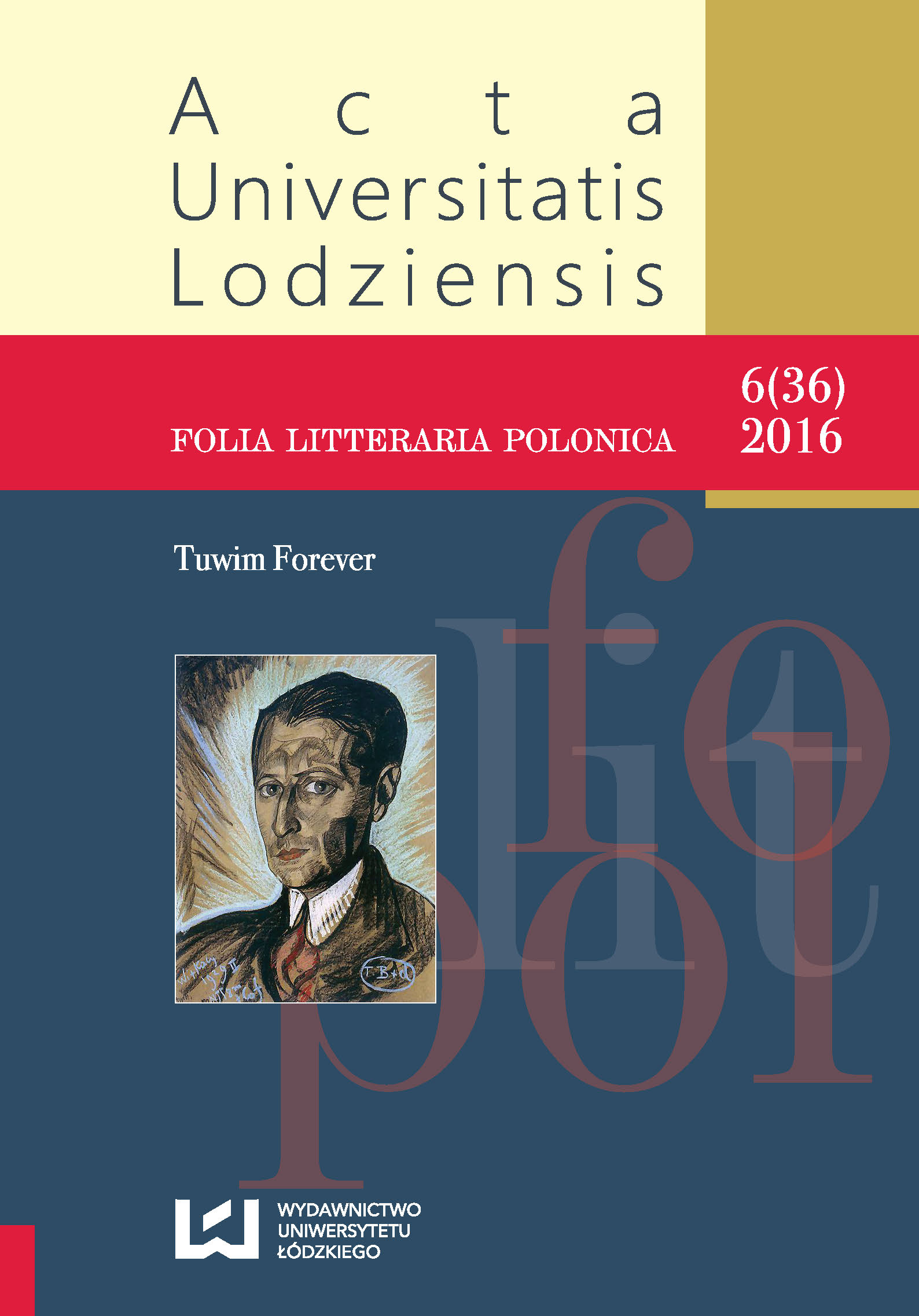Tuwim’s Wedge: 'Survival Strategies' of a Polish-Jewish Poet
DOI:
https://doi.org/10.18778/1505-9057.36.05Słowa kluczowe:
Julian Tuwim, Jewish identity, Polish-Jewish poet, polonisation, assimilation, antisemitism, self-fashioningAbstrakt
Tuwim’s approach to the “Jewish question” has already been analyzed by Polish and foreign scholars. The article is intended to consider some “survival strategies” of the Polish poet from a slightly different angle. In Poland, in the period between the wars Jewish writers were persuaded to accept total polonization and a rejection of their ethnic identity; yet, at the same time they often suffered a rejection from the circles of Polish artists. Any attempt of highlighting their Jewish identity or even a slight interest in Jewish culture incited brutal Jew-bashings.
Tuwim considered his being a Polish Jew not only as a fact to be proud of, but also as an opportunity for engaging with self-criticism. He painfully felt the Jewish question as “a powerful wedge cleaving [his own] worldview”. However, like many other Polish-Jewish writers he masked its enduring presence in his own psyche, constructing his public persona through a process of self-fashioning.
This paper tries to follow the traces of this “wedge” in Tuwim’s works: from poems supposedly having nothing to do with the “Jewish question”, to encrypted allusions to the great Yiddish writers, from his relentless questioning of all forms of intolerance and nationalist rhetoric, to his conviction that a new poetic language could “reform the world” and become a homeland for all readers regardless of their nationality.
Pobrania
Bibliografia
Antisemitism and its Opponents in Modern Poland, R. Blobaum (ed.), Cornell University Press, Ithaca–London 2005.
Google Scholar
Bulat Mirosława, Źródła do badania dziejów scen żydowskich w Łodzi, in: Łódzkie sceny żydowskie, M. Leyko (ed.), Wydawnictwo Uniwersytetu Łódzkiego, Lodz 2000.
Google Scholar
Hertz Aleksander, Żydzi w kulturze polskiej, Margines, Warsaw 1988.
Google Scholar
Imber Samuel Jakub, Asy z czystej rasy, Biblioteka S.J. Imbera, Cracow 1934.
Google Scholar
Insiders and Outsiders. Dilemmas of East European Jewry, R.I. Cohen, J. Frankel, S. Hoffman (eds.), Littman Library Of Jewish Civilization, Oxford–Portland 2010.
Google Scholar
Julian Tuwim. Dyskusja z udziałem Aliny Molisak, Belli Szwarcman-Czarnoty, Michała Głowińskiego i Piotra Matywieckiego, “Midrasz” 2013, issue 5.
Google Scholar
Kafka Franz, Dzienniki 1910–1923, translated by J. Werter, Wydawnictwo Literackie, Cracow 1961.
Google Scholar
Korczak Janusz, Koszałki opałki. Humoreski i felietony [Dzieła, t. 2], t. I–II, H. Kirchner (ed.), compilation and footnotes by B. Wojnowska, Oficyna Wydawnicza Latona, Warsaw 1998.
Google Scholar
Korzhenkov Aleksander, The Life of Zamenhof, translated by I.M. Richmond, H. Tonkin (ed.), Mondial & Universal Esperanto Association, New York 2010.
Google Scholar
Łódzkie sceny żydowskie, M. Leyko (ed.), Wydawnictwo Uniwersytetu Łódzkiego, Lodz 2000.
Google Scholar
Matywiecki Piotr, Twarz Tuwima, W.A.B., Warsaw 2007.
Google Scholar
Michlic Joanna Beata, Culture of Ethno-Nationalism and the Identity of Jews in Inter-War Poland, in: Insiders and Outsiders. Dilemmas of East European Jewry, R.I. Cohen, J. Frankel, S. Hoffman (eds.), Littman Library Of Jewish Civilization, Oxford–Portland 2010.
Google Scholar
Rozmowy z Tuwimem, T. Januszewski (ed.), Semper, Warsaw, 1994.
Google Scholar
Polonsky Antony, “Why did they hate Tuwim Boy so much?”. Jews and “Artificial Jewsz” in the Literary Polemics in the Second Polish Republic, in: Antisemitism and its Opponents in Modern Poland, R. Blobaum (ed.), Cornell University Press, Ithaca–London 2005.
Google Scholar
Shmeruk Chone, Przegląd literatury w języku jidysz do I wojny światowej, in: Teatr żydowski w Polsce. Materiały z międzynarodowej konferencji naukowej, Warszawa, 18–21 października 1993 roku, A. Kuligowska-Korzeniewska, M. Leyko (eds.), Wydawnictwo Uniwersytetu Łódzkiego, Lodz 1998.
Google Scholar
Słonimski Antoni, Tuwim Julian, W oparach absurdu, Wydawnictwo Iskry, Warsaw 2008.
Google Scholar
Steiner George, Po wieży Babel. Problemy języka i przekładu, translated by O. and W. Kubińscy, Universitas, Cracow 2000.
Google Scholar
Teatr żydowski w Polsce. Materiały z międzynarodowej konferencji naukowej, Warsaw, 18–21 October 1993, A. Kuligowska-Korzeniewska, M. Leyko (eds.), Wydawnictwo Uniwersytetu Łódzkiego, Lodz 1998.
Google Scholar
Tomassucci Giovanna, “Io sono a scacchi”. L’identità ebraica nell’opera letteraria e teatrale di Janusz Korczak, in: Janusz Korczak, il suo tempo e il suo retaggio, L. Battaglia, L. Quercioli Mincer (eds.), Università di Genova, Genua 2014 [“Quaderni di Palazzo Serra” 24].
Google Scholar
Tuwim Julian, Dzieła, vol. I–V, compilation by J.W. Gomulicki, S. Pollak, J. Stradecki, Czytelnik, Warsaw 1955–1964.
Google Scholar
Tuwim Julian, Tam zostałem. Wspomnienia młodości, Czytelnik, Warsaw 2003.
Google Scholar
Tuwim Julian, Utwory nieznane. Ze zbiorów Tomasza Niewodniczańskiego w Bitburgu. Wiersze, kabaret, artykuły, listy, T. Januszewski (ed.), Wydawnictwo Wojciech Grochowalski, Lodz 1999.
Google Scholar
Urbanek Mariusz, Tuwim. Wylękniony bluźnierca, Wydawnictwo Iskry, Warsaw 2013.
Google Scholar
Węgrzyniak Rafał, Hebrajskie studio dramatyczne w Łodzi, in: Łódzkie sceny żydowskie, M. Leyko (ed.), Wydawnictwo Uniwersytetu Łódzkiego, Lodz 2000.
Google Scholar
Winczakiewicz Jan, Izrael w poezji polskiej. Antologia, Instytut Literacki, Paris 1958.
Google Scholar
Wspomnienia o Januszu Korczaku, L. Barszczewska, B. Milewicz (eds.), Nasza Księgarnia, Warsaw 1981.
Google Scholar
Żeleński Tadeusz (Boy), Pisma, series 4, vol. 22: Flirt z Melpomeną, J. Kott (ed.), PIW, Warsaw 1964.
Google Scholar
Żydzi polscy według Tuwima, Centrum Dialogu im. Marka Edelmana, Lodz 2013.
Google Scholar
Pobrania
Opublikowane
Jak cytować
Numer
Dział
Licencja

Utwór dostępny jest na licencji Creative Commons Uznanie autorstwa – Użycie niekomercyjne – Bez utworów zależnych 4.0 Międzynarodowe.











